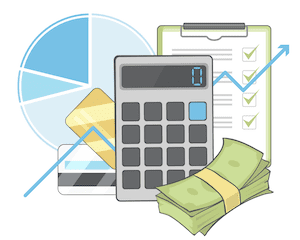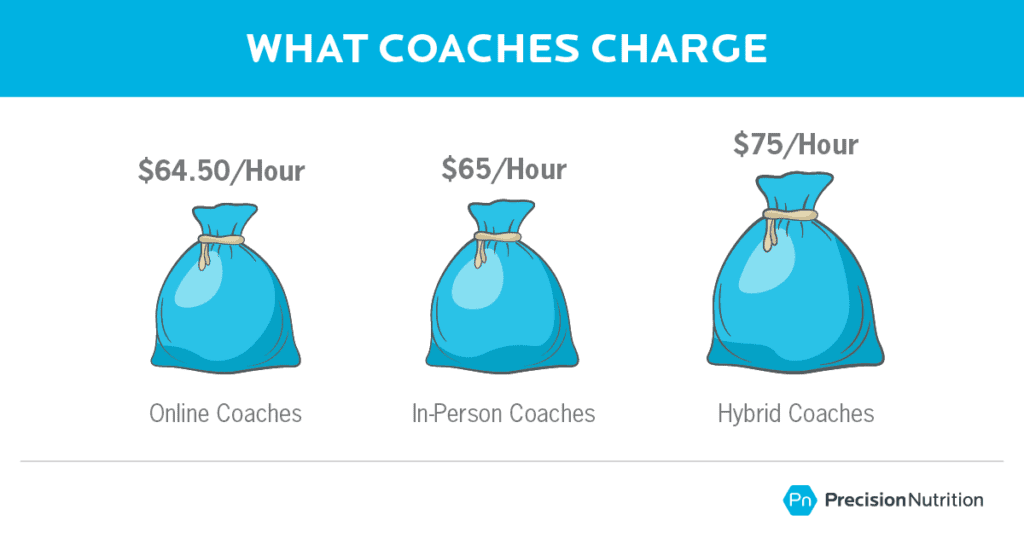Reviewed by Toni Bauer, PN2, NBC-HWC
People ask: “What’s the average health coach salary?”
But what most folks really want to know something else:
Can you make a good living doing this?
In other words, should you:
- Invest in a nutrition- or health-coaching certification?
- Launch a part-time coaching business on the side?
- Quit your job in another field so you can focus 100 percent on coaching?
Here, you’ll find answers, so you can make these important career decisions with confidence.
For this article, we tapped the expertise of some of the most successful coaches in the world, including ones who’ve earned our certifications.
You’ll hear from:
▶ Someone who left a six-figure corporate executive job—and then found a way to make even more as a health coach. He shares exactly what he did to get where he is today.
▶ Several founders of expanding health-coaching companies who hire full-time coaches. You’ll learn what they look for in job candidates.
▶ A man who netted more than 50 regular clients during his first two years of coaching by finetuning his niche and raising his rates.
Thanks to their insights, industry reports, and our own internal survey data, you’ll discover:
Average annual salary ranges for full-time and part-time coaches
An income calculator created especially for coaches
Three business strategies that separate average-earning coaches from those who are super earners
Health coaching: Is it a viable career?
Let’s get real: This economy isn’t great for some job seekers.
But if you type “health coach” into a job search site, you’ll end up with thousands of results. It’s no wonder that LinkedIn listed health coaching as one of the fastest growing careers.
Driving this growth: the healthcare industry, which increasingly taps health coaches to motivate patients to practice a range of habits, saving between $286 and $412 per patient per month in insurance costs.1
(FYI, throughout this article, we quote pricing in US dollars.)
But medical practices and insurers aren’t the only people looking for health, nutrition, and wellness coaches. Others include:
- Healthcare practices, such as physical therapy and chiropractic offices
- Lifestyle companies that offer coaching as part of a larger package of options
- Fitness centers and spas
- Coaching apps
- Established coaches who have more clients than they can serve on their own
In other words, now’s a great time to break in.
Even better, the pay is more than decent.
Your health coach salary, however, will depend on whether you run your own business or work for someone else. Let’s start with self-employed coaches.
What’s the average self-employed health coach salary?
We calculated these yearly rates based on data collected from hundreds of coaches. Keep in mind, these numbers are averages: Some coaches make less; some make more.
A lot more.
Estimated yearly income: $40,000 to $240,000+
Okay, that’s obviously a huge range. As with any business, the amount of money you make depends on many factors, including how much you charge each client, your levels of interest and motivation, the time you can commit, and the results you can deliver.
To see all the possibilities for how much you can make as a coach based on your unique circumstances, check out the calculator below.
Perks:
✓ You’re the boss. You set your rates, hours, niche, packages… everything.
✓ You’re in charge of your earning potential. The more clients you take on, the more you can earn. And if you attract more clients than you can handle? You have the option of hiring coaches to work for you.
What’s the average health coach salary if you work for a company?
If self-employment isn’t right for you, there’s another option. You can work for a company that employs health and nutrition coaches. And while you won’t have as much control over your earning potential, you can still make a great living.
The salaries listed below are based on industry reports, our internal data, and interviews with several coaching companies. Know that these ranges are averages. Some companies pay more; others less.
Full-time salaries: $40,000 to $75,000
Part-time salaries: $20,000 to $40,000
Perks:
✓ You can focus completely on what you love: coaching. “It’s incredible for people who love the coaching side of coaching, but don’t love the entrepreneurial or administrative side, such as billing, lead generation, and marketing,” says Molly Galbraith, founder of Girls Gone Strong and author of Strong Women Lift Each Other Up.
✓ You’ll usually use already-developed protocols and lessons to guide you through the coaching process. “If you’re a coach who isn’t quite ready to go out on your own, it can function like training wheels,” says Galbraith.
✓ Real, restful, 100 percent work-free vacations exist. Because you’re often not the only coach on staff, you have others to cover for you when you want to put your phone on silent.
What companies look for when hiring new health coaches
Below you’ll find what several hiring managers told us they like to see in job candidates. Ideal candidates:
✓ Possess a nutrition or health coaching certification (or are willing to get one).
✓ Have a passion for helping people.
✓ Exude the qualities of a “good” coach, such as emotional intelligence, empathy, active listening, professionalism, and communication skills.
You may wonder: Do you need coaching experience?
For some companies, yes.
Others, like Stronger U Nutrition, are willing to hire and train new coaches, especially if they’re coming from a complementary career such as the service industry, human resources, or organizational leadership, says founder Mike Doehla, PN1, a former human resources manager.
“This was me,” he says, “I was in another career before I became a coach. People can break into this later in life and have a fruitful career.”
Want to earn six figures? Use this calculator to estimate your health coach salary.
If you’re a self-employed coach, our Health Coach Salary Calculator uses your income goals to help you determine:
- How many clients you can maintain in the time you have available to coach.
- How much time you can spend with each client based on the type of coaching you want to provide.
- What you’ll need to to charge each client per month to meet your income goals.
Here’s the really cool part: The calculator will estimate everything else you need to take into account (expenses, taxes, extra cash goals) and how they affect your bottom line.
Once you get your results, feel free to tinker with the numbers. Want to have fewer clients? Bump up your price per client. Think you could charge a little more and keep your client numbers the same? Go for it!
Bottom line: This calculator will help you wrap your head around what needs to happen in order to make your health coach salary dreams a reality.


© Precision Nutrition
How to set your rates as a self-employed health or nutrition coach
Our Health Coach Salary Calculator will help you zero in on a salary range that makes sense for your life and goals. To start thinking about how to translate that into real life, consider these questions.
Question #1: Do you specialize in a niche?
Rather than work with everyone and anyone who could use some help, many coaches focus on a specific type of client or area of expertise. Depending on what your client population can afford, it might make sense to charge more (or less) than the going rate.
Real-life examples: Precision Nutrition Certified Coach Stephen Beard (CHC, CPT, PN1) initially decided to target corporate executives, which makes sense given his former career as an executive in retail.
Galbraith zeroed in on women. Jon Mills, PN2, a coach with a thriving nutrition and training practice, specializes in the queer community.
(We’ll explore how to define your niche a little later.)
Question #2: Will your business involve high-volume coaching, super-individualized coaching, or a blend of the two?
Some coaches opt for volume, working with 100 or more clients. They keep their rates relatively low (say, $50 to $150 a month) and save time by leaning into virtual health coaching, group sessions, and/or pre-written lessons, workouts, and protocols. This is known as low-touch coaching.
Other coaches do the opposite, charging a premium (think: $500 or $1,000 a month) for lots of one-on-one attention and personalization, also known as high-touch coaching. This allows them to keep their overall number of clients low—usually somewhere between 5 to 30—while still making a good living.
And, of course, some coaches use a blend of those approaches.
Real-life examples: Beard built a high-touch business to attract the corporate execs he chose to target.
Doehla, on the other hand, launched Stronger U Nutrition, a virtual coaching business that serves a larger number of clients. He’s since hired dozens of coaches to help with the client load, and recently sold his app-based company to Self Esteem Brands, the parent company of Anytime Fitness.
Question #3: Where do you live? (Yep, even if you’re trying to work out your virtual health coach salary.)
As a general rule, coaches who work with clients locally or in person are able to charge more in cities and economically-booming areas than in rural and economically-depressed locations.
Even if you’re working virtually, it can be helpful to take cues from your fellow coaches in the area. That’s because the local going rate (or the going rate in other comparable areas) is more likely to correspond with your cost of living than the average rate in a place that’s not similar to where you live at all.
Real-life example: When Beard moved from Miami to Orlando, he learned that Miami’s $95-per-hour rate for personal training was too high to attract clients in Orlando, who were used to paying closer to $75.
So that $75-per-hour personal training rate is what he used to calculate his coaching rates.
“Logically, if someone is willing to pay that rate for help with proper movements and corrective exercises, they’re going to be willing to pay at least that much for a package that also includes nutrition coaching, which is the most important piece of the weight loss puzzle,” Beard says.
His math looked like this: $75 x 2 days a week x 12 weeks.
Then Beard subtracted $50 for a new client discount. That gave him his rate: $1,750 for a 12-week package. Now, a little more than two years later, he’s charging $4,000 for 12 weeks. (We’ll explain how he reached that phenomenal rate in the next section.)
Three secrets of “super earners”
Not long ago, in one of our Facebook coaching communities, someone asked, “What’s the going rate for coaching?”
Dozens of people commented. Coaches said they charged $250 a month, $500 a month, $1,000 a month—even $2,500 a month.
Many newer coaches, of course, wanted to know: How does someone get to the point when they can charge that much?
So we tracked down several super earners and asked them. Based on their answers as well survey data we’ve collected from our coaching community, we teased out a few secrets.
Secret #1: Believe in your value.
According to our survey of more than 1,000 coaches: Those who feel “completely confident” in their skills charge more than coaches who are only “somewhat confident,” or “a little confident or less.” They aspire to the highest rates in the industry—and also feel worthy of those rates.
People who lack confidence, on the other hand, tend to have the lowest rates in the industry, explains Matthew Walrath, PN1, founder of Beyond Macros. (Walrath himself charges around $2,500 a month to help health and nutrition coaches build their businesses.)
Often, he finds they’re mired in one or more of the following thinking traps.
▶ “Who am I to be charging this much?”
Imposter syndrome makes it difficult for coaches to firmly state their rates, Walrath says. “They stutter over their pricing.”
▶ “I wouldn’t pay that much for coaching. Why would someone else?”
Truth is, you wouldn’t pay that much for coaching because you, most likely, don’t really need coaching—at least not with the same intensity that your clients need it, Walrath explains.
“As Precision Nutrition coaches, we’ve already invested in learning how to manage our nutrition, so the amount we’re willing to invest in coaching is probably pretty small,” he says.
Walrath suggests you consider a problem that you would pay someone $500+ a month to solve.
Maybe it’s that tutor your kid needs to finally pass algebra.
Or the physical therapy that’s finally freeing you from chronic pain.
Or the person who walks your dog while you’re at work, which means your new couch lasts years rather than days, the garbage and recycling bins remain upright, and putrid packages are deposited outdoors rather than in.
For stuff like that, as long as you have the money, no price is too high, right?
And that’s how your clients feel about you.
“When you solve a problem for someone, you’re able to charge what a transformation is worth,” says Walrath.
➤ “I wouldn’t be able to afford myself!”
Thankfully, you don’t need to afford yourself. You only need a handful of clients who can afford you—and these people really do exist.
Within his first two years of coaching, Walrath attracted more than 50 people willing to pay $500 a month. That was too many clients for him to coach on his own, which is why he’s since hired two full-time coaches to work for him.
Secret #2: Specialize in a niche or special population—and be willing to change your mind.
Both Beard and Walrath started out focusing on corporate executives, which seemed to make sense. If anyone can afford to pay $500 to $2,500 a month for coaching, it’s execs.
Problem is, Walrath didn’t know many top-level managers, which made it difficult to attract them.
And, as Beard learned, company directors might all have the same job title, but they hire coaches for hundreds of different reasons.
One executive might want help with food sensitivities. Another might want to lose fat. Still another may want to find ways to eat healthier while traveling.
That diverse set of problems made it difficult to nail down an irresistible program and marketing message.
To figure out your niche, Walrath suggests thinking about three questions:
➤ Who do you know?
➤ What do you love to do?
➤ Who needs your help?
Those questions got Walrath thinking about CrossFit. It was something he loved to do. As a result, he already knew hundreds of CrossFit enthusiasts who wanted help with nutrition, sleep, and stress management.
Similarly, Beard decided to work with people with diabetes. He has type 1, which allowed him to understand the health challenges faced by that population of people. He also knew many people with diabetes already and felt driven to help them.
Secret #3: Raise your rates over time.
The super coaches we interviewed increased what they charged as they gained clients, experience, and education. In other words, they built up their health coach salary over weeks, months, and years.
Here’s how to follow in their footsteps.
- Start with whatever rate you’re comfortable charging. Let’s say it’s $200 a month. In your marketing, you might frame your fee as a “new client discount” or an “introductory rate.”
- As soon as you get one client, bump up your rate by $50. So now your rate for new clients is $250.
- Keep bumping your monthly rates up by $50 as you sign up more clients and grow in confidence.
How often you up your pricing is up to you.
Some coaches bump up their rates for every single new client. Others do it only after they’ve reached a certain client threshold—say every 10 to 15 clients.
There are no right or wrong answers.
Similarly, some coaches keep their existing clients at the same rate and only increase rates for new clients. Other coaches raise their rates for everyone.
“You go up and up until you get to the point that you are charging what you want to charge and it doesn’t feel so scary,” Walrath says.
Don’t care about making a six-figure nutrition coach salary? That’s okay.
Actually, it’s pretty common.
“Many coaches aren’t chasing money. They’re chasing good work-life balance and fulfillment,” says Doehla.
That’s why lots of coaches choose to work with people who can’t pay $500 or more a month. Rather than focus on earning top rates, these coaches might:
- Set their rates based on what their target community can afford.
- Offer sliding scale prices.
- Use a Pay What You Want (PWYW) model, which is, surprisingly, more profitable than many people think, finds research.2,3 Precision Nutrition super coach Jon Mills, PN2, once worked at a gym that switched to a PWYW model for workshops. End result: Regular attendees chose to pay more than the previous rate. Lots of newcomers signed up as well. Overall, the gym netted roughly the same as a flat-fee based workshop.
These pricing models also allow coaches to work with underserved communities, which can be incredibly rewarding, not to mention noble.
The unquantifiable perks of health coaching
Regardless of how much or how little they’re making, many coaches will tell you that they don’t do this for the money. Instead, they do it for the things money can’t buy.
We’re talking about:
➤ That feeling you get when you’ve helped someone transform their life for the better.
➤ Doing what you love—all. day. long.
➤ Knowing that your job will never stop you from living your life.
Before becoming a coach, Beard worked six days a week and traveled most weeks out of the year. After missing out on a series of important family events and get-togethers with friends, he decided, “I’m done with this career.”
“All of the money I was making wasn’t making me as happy as I thought it would,” says Beard. As a coach, Beard’s now earning more than his former corporate salary. But the income isn’t what makes coaching worth it to him.
It’s actually being able to spend time with his nieces and nephews during the holidays, he says.
“That’s priceless.”
References
Click here to view the information sources referenced in this article.
Ready to move from competent to truly masterful—in 20 weeks?
The PN Level 2 Master Health Coaching Certification is an advanced, practice-based program designed for coaches who want to work at a deeper level—and do it sooner than the traditional 5–10 year path.
This is not a nutrition course.
It’s a mentored, small-group experience that prepares you to:
- Work confidently with complex client realities like stress, mental health, and emotional setbacks
- Apply behavior change principles that hold up when life gets messy
- Understand clients beyond food and fitness—so change actually lasts
You’ll learn directly from PN’s most experienced coaches through weekly live mentorship, structured self-study, and real-world coaching practice.
Why it matters
Level 2 is NBHWC-approved, making graduates eligible for:
- National Board Certification through the NBHWC
- Professional membership with the Health Coaches Alliance (HCA)
These credentials expand your career options and set you apart in an increasingly crowded field.






Share